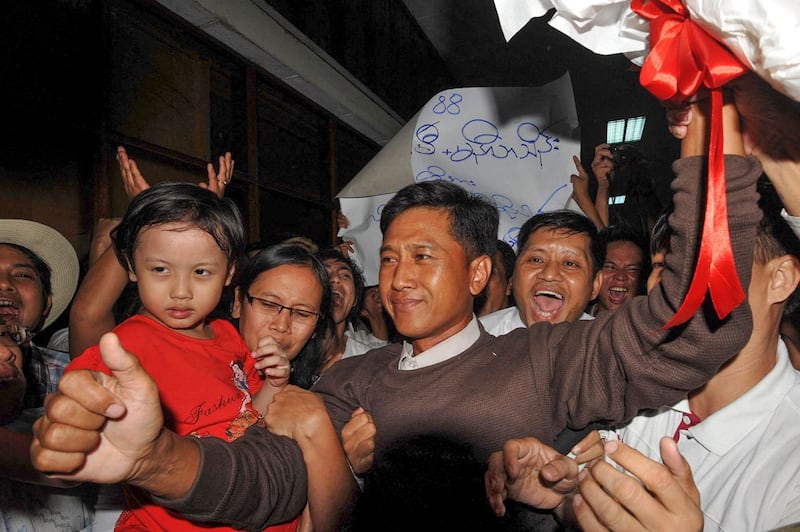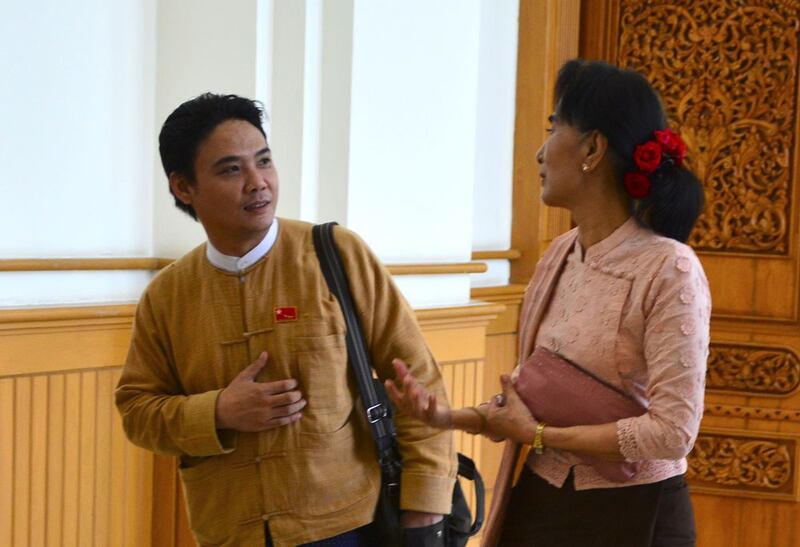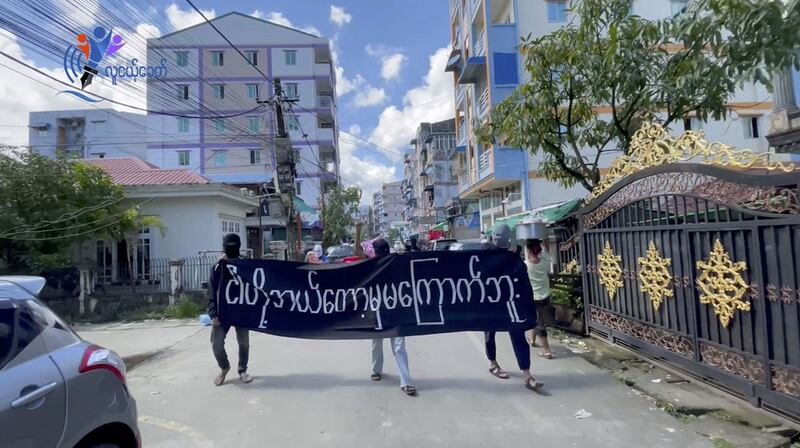UPDATED 5.37 P.M. EDT on 2022-7-25
Myanmar’s junta has executed veteran democracy activist Ko Jimmy and a former lawmaker from the ousted National League for Democracy, state media reported Monday in an act that drew widespread international condemnation.
The official Global New Light of Myanmar announced the executions of Ko Jimmy, whose real name is Kyaw Min Yu, former National League for Democracy lawmaker Phyo Zeya Thaw and activists Hla Myo Aung and Aung Thura Zaw without reporting the date and method of killings, although it is believed the men were all hanged on Saturday in Yangon’s Insein Prison.
>> Interview: Families of executed Myanmar activists press for return of remains
The Global New Light of Myanmar said "the punishment has been carried out under the prison's procedures," without elaborating.
Former student leader Ko Jimmy was convicted on terrorism charges for activities against the military regime that has ruled the country since a coup in February 2021, according to state media.
The first judicial executions in Myanmar since 1976 came despite a direct appeal on June 11 by Cambodian Prime Minister Hun Sen to junta leader Sen. Gen. Min Aung Hlaing.
>> Execution of democracy icons shows Myanmar junta is desperate to exert control
The executions “would trigger a very strong and widespread negative reaction from the international community” and hurt efforts to find a peaceful solution to the crisis in Myanmar," wrote Hun Sen in his role as chair of the Association of Southeast Asian Nations (ASEAN), of which Myanmar is a member.

\
Ko Jimmy was a prominent leader of the pro-democracy 88 Generation Students Group who fought military rule three decades ago.
The 53-year-old activist was arrested in October after spending eight months in hiding and was convicted by a military tribunal in January under the Counter-Terrorism Law.
He was accused of contacting the Committee Representing Pyidaungsu Hluttaw, National Unity Government (NUG), and People’s Defense Force (PDF), an opposition coalition and militia network formed by politicians ousted in the Feb. 1 coup that the junta has declared terrorist organizations.
In September, the NUG declared a nationwide state of emergency and called for open rebellion against junta rule, prompting an escalation of attacks on military targets by various allied pro-democracy militias and ethnic armed groups.
Ko Jimmy, an outspoken critic of the junta, was also accused of advising local militia groups in Yangon and ordering PDF groups to attack police, military targets, and government offices, and asking the NUG to buy a 3D printer to produce weapons for local PDFs.
On June 3, Ko Jimmy, former National League for Democracy lawmaker Phyo Zeya Thaw, and two others lost appeals of their death sentences. The junta rejected the possibility of a pardon for the condemned men.

The four death sentences, as well as 110 others that have been handed down by junta courts between the military’s Feb. 1, 2021, coup, and May 19 this year, have drawn criticism from legal experts and rights groups, who say the regime is threatening the public with unfair executions.
The United Nations, Washington, the European Union, Ottawa, Tokyo, and Paris have issued statements strongly condemning the decisions in the cases now proceeding to execution.
“I am dismayed that despite appeals from across the world, the military conducted these executions with no regard for human rights,” said UN High Commissioner for Human Rights Michelle Bachelet. “This cruel and regressive step is an extension of the military’s ongoing repressive campaign against its own people.
“These executions – the first in Myanmar in decades - are cruel violations of the rights to life, liberty and security of a person, and fair trial guarantees. For the military to widen its killing will only deepen its entanglement in the crisis it has itself created," she said in a statement.
'Depraved acts'
UN Special Rapporteur on the Situation of Human Rights in Myanmar, Tom Andrews, released a statement Monday saying: “I am outraged and devastated at the news of the junta’s execution of Myanmar patriots and champions of human rights and democracy. My heart goes out to their families, friends and loved ones and indeed all the people of Myanmar who are victims of the junta’s escalating atrocities. These individuals were tried, convicted and sentenced by a military tribunal without the right of appeal and reportedly without legal counsel in violation of international human rights law.”
Andrews said these “depraved acts” must persuade the international community to take stronger action against the military junta.
“Having made a mockery of the Five Point Consensus, Min Aung Hlaing has now callously rejected the personal appeal of the Chair of ASEAN, Prime Minister Hun Sen, to spare the lives of these individuals. ASEAN – and indeed all UN Member States – must take action that is commensurate with this outrage,” Andrews said.
U.S. Secretary of State Antony Blinken called the executions “reprehensible acts of violence” and said they illustrate the junta’s “complete disregard for human rights and the rule of law.”
“The United States joins the people of Burma in their pursuit of freedom and democracy and calls on the regime to respect the democratic aspirations of the people who have shown they do not want to live one more day under the tyranny of military rule,” he said, using an older name for the Southeast Asian nation.
The European Council condemned the junta for its lack of respect "for the life or dignity of the very people they are supposed to protect."
"[The executions] will only exacerbate the polarization, violence and dramatic humanitarian situation in Myanmar," the Council said in a statement.

Beijing, which has continued to support Myanmar's junta despite condemnation from the West, refrained from commenting on the executions, with Ministry of Foreign Affairs spokesperson Zhao Lijian telling Reuters news agency that China "always adheres to the principle of non-interference in other countries’ internal affairs."
"We always maintain that all parties and factions in Myanmar should properly handle their differences and conflicts within the framework of the Constitution and laws with an eye on the long-term interests of the country and the nation," he said.
Calls for accountability
Elaine Pearson, Acting Asia Director of Human Rights Watch said the executions were "an act of utter cruelty," especially since the four men's families only found out through state media reports.
“The junta’s barbarity and callous disregard for human life aims to chill the anti-coup protest movement. European Union member states, the United States, and other governments should show the junta that there will be a reckoning for its crimes. They should demand immediate measures, including the release of all political prisoners, and let the junta know the atrocities it commits have consequences.”
In an interview with RFA Burmese last month, Ko Jimmy’s wife Nilar Thein called the planned executions “a blatant violation of human rights” for which the junta would be held accountable.
“Regardless of what they will do, I want them to know they will be accountable for their decisions. Their acts will not be forgotten,” said Nilar Thein.
Responding to Monday's announcement, NUG Foreign Minister Zin Mar Aung saluted the courage of the activists and warned ASEAN and U.N. member states that Min Aung Hlaing "will never listen, nor commit to any promise he has made."
Activist group Justice for Myanmar tweeted: "The shocking executions of Phyo Zeya Thaw, KoJimmy, Hla Myo Aung and Aung Thura Zaw are #CrimesAgainstHumanity and #WarCrimes. All perpetrators from Min Aung Hlaing down must be held accountable for these brazen acts of cruelty. #EndImpunity."
In its latest annual report covering the judicial use of the death penalty for the period January to December 2021, London-based rights group Amnesty International found that dozens of people were "arbitrarily sentenced to death" by Myanmar's military tribunals, "several without the defendants being present, in what was widely perceived as a way to target political opponents and protestors."
The group said that prior to February 2021, Myanmar’s known death sentences were sporadically imposed for murder and usually commuted through mass pardons. However, the yearly average for the years 2017-2020 had remained lower than 10.
The last execution in Myanmar — that of student leader Salai Tin Maung Oo — was known to take place in 1976, during the time of the late Gen. Ne Win.
Written By Paul Eckert.
CORRECTION: An earlier version of this story incorrectly stated that Myanmar's last judicial execution took place in 1988.
This story has been updated to include reactions from U.S. State Department, China's Ministry of Foreign Affairs, Human Rights Watch, NUG Foreign Minister.
